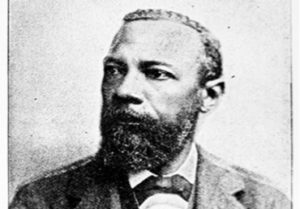
*The birth of Jacob C. White Jr. is celebrated on August 28th 1837. He was a Black educator, intellectual, and abolitionist.
Jacob Clement White Jr. was the son of Jacob White Sr. and Elizabeth White. He was raised at 100 Old York Road in Philadelphia’s predominantly white Jenkintown neighborhoods. His father was a barber and physician who was well-respected in the black community, formerly the owner of a china shop that sold products produced by free negro labor, avoiding products produced by slave labor. A savvy businessman, White Sr. enjoyed the benefits of profitable real estate investments, becoming an eminent figure in Philadelphia's exclusive inner circle of elite blacks. White Sr. engaged in several endeavors promoting education and was a long-time abolitionist; both of his passions were passed to the young White.
White attended the Lombardy Street Public School and in 1853, the Institute for Colored Youth (ICY). Founded by the Society of Friends (Quakers), the ICY emphasized high moral standards for its students and offered a classical study of Latin, Greek, and trigonometry. While enrolled, White expressed an acute awareness of black society and psychological concepts in essays he presented. On May 24, 1855, he addressed Governor James Pollock at a special reception for the institute, touching on the issue of African American citizenship. The same year, White was elected secretary of the Banneker Institute, a student instructional society that convened weekly to have scholarly discussions. White graduated from the ICY on May 6, 1857. In 1858, accepted a teaching position at the ICY's preparatory school for boys. White furthered his interests in mathematics during his teaching stint at the institute. He became a lecturer on the subject while a member of the mathematics committee of the Banneker Institute, also becoming a proficient chess player in his leisure time.
He was an agent for the Anglo-African weekly newspaper (1860–1861) and Pine and Palm (1860–1862). In 1861, he became a representative at the Haitian Bureau of Emigration, empowering him with the transfers of funds for free blacks that sought to move to Haiti, via New York. As a result of his different ventures, White became a relatively wealthy man at a young age. Long interested in an administrative role, White was the leading candidate for principal of the neglected Roberts Vaux Consolidated School. In 1864, he was appointed principal, the first Black person in Philadelphia to assume such a role. Originally housed in the poorly ventilated basement of the Zoar Methodist Church, under White's leadership, the Vaux school moved to the building formerly housing the William D. Helley School and tripled in attendance.
White's administration facilitated the integration of the educational system in Philadelphia, including the end of segregation at Central High School and Girls' Normal School. Satisfied with his accomplishments, White retired from the position in June 1896. During his tenure as a teacher at the ICY, White closely collaborated with Octavius Catto, a civil rights activist and long-time friend. In the spring of 1866, White and Catto established the Philadelphia Pythians, a baseball club composed mainly of men from the Knights of Pythias fraternal organization. Soon, Pythian games became a popular fixture of the black community. The Pythians enjoyed several successful seasons but Catto's murder in 1871 signaled an end in team activities until their reformation for the 1887 season of the National Colored Base Ball League.
Following Catto's death, White became an active statesman for Philadelphia’s African American community. His memberships included the National Equal Rights League, Pennsylvania Abolition Society, and the Social, Civil, and Statistical Association of Pennsylvania, contributing as a secretary. In 1895, White was appointed the president of the board for the Douglass Memorial Hospital. Under his direction, he appropriated state funds for the hospital in 1898 from Alexander K. Pedrick of the State Senate. Jacob C. White Jr. resigned from his position but maintained a seat on the board until his death on November 11, 1902.